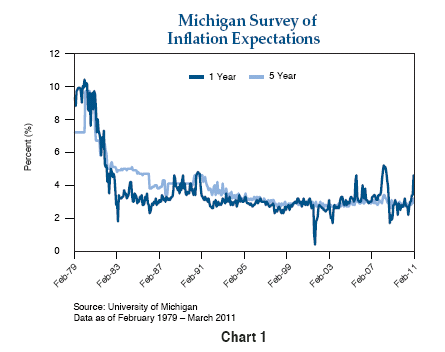In a recent research report PIMCO’s Richard Clarida discussed a hot button topic these days – inflation expectations. But Clarida doesn’t merely point out that consumers expect high inflation in the coming months. After all, that’s yesterday’s news. Clarida asks what will happen if this inflation fails to materialize and expectations collapse? Could it actually feed into falling prices and the classic Japan deflation scenario? Clarida thinks so:
“But just as there is a large economic cost involved when implementing disinflationary policies in response to surging inflation expectations, there is also a potentially large cost involved in allowing deflation to persist (or worsen) when inflation expectations collapse: Witness the experience in Japan since the 1990s. Deflating economies rarely prosper – there is a reason the phrase “the Go Go 1930s” never did enter the lexicon – and deflating financial systems often founder as nominal financial obligations incurred earlier (the Go Go 1920s?) when inflation was positive are much more difficult to service when prices, wages, revenues and profits are stagnant.
In addition, deflation itself can complicate policymakers’ efforts to engineer the reflation that can pull the economy out of its deflationary trap, a trap in which expectations of future deflation beget ongoing deflation. Central banks are limited by the zero lower bound on the short-term policy interest rate that in normal times they adjust to keep inflation close to target and output close to potential. At the zero bound, which many major central banks bumped against in darkest days of the financial crisis, the remaining monetary policy options available are all “unconventional”: quantitative and credit easing, unsterilized foreign exchange intervention, or providing banks unlimited liquidity against a wide range of unorthodox collateral.
Unconventional measures helped stabilize the global economy after its collapse in the winter of 2008–2009 and, since then, have continued to support an ongoing if uneven recovery in global economic activity. However, these policies were not implemented without concerns about their actual or potential collateral costs. Most, if not all, central banks that recently enacted unconventional monetary policies are seeking to exit from them at the earliest appropriate time – and immediately communicate to the markets their strategy for doing so.”
Good forward looking thoughts. While inflation has certainly perked up in recent months it is still well below the historical trend. This isn’t a surprise given my expectations for rising inflation and very strong seasonal trends in oil and gas markets. But a forward looking investor has to ask him/herself what could happen to expectations if oil and other commodities peak with the end of strong seasonal trends and the end of QE2? As we saw in 2008 expectations collapsed and the deflationary mindset actually helped turn a weak economy into a recession. The strong psychological impact that Ben Bernanke has been relying on could in fact be his worst enemy.
For now, we appear to be running budget deficits that make us distinctly different from Japan. We have not fallen into their trap of stopping and starting the government safety net via deficit spending. For this reason, I believe the economic recovery is likely to continue, albeit at a weak pace. The Fed’s unconventional monetary policy has thrown a real wrench in that outlook, however. They have altered investor expectations in unpredictable and undesirous ways. Although I am not backing down from my expectations of low single digit inflation in 2011, one has to wonder if expectations will play a large role in the end of QE2 and asset pricing. As my POMO case study showed in October, there is a very high correlation between psychology and asset prices. There is clear evidence that expectations have substantially altered prices on the way up.
One has to wonder what will happen to expectations as this unconventional monetary policy ends and consider the possible negative ramifications. In an effort to bolster an economy that didn’t actually need help, the Fed appears to have panicked and jumped the gun with QE2. The unfortunate downside is that the economy appears to have peaked with the onset of the program and this psychological tinkering only makes matters more unstable.
Mr. Roche is the Founder and Chief Investment Officer of Discipline Funds.Discipline Funds is a low fee financial advisory firm with a focus on helping people be more disciplined with their finances.
He is also the author of Pragmatic Capitalism: What Every Investor Needs to Understand About Money and Finance, Understanding the Modern Monetary System and Understanding Modern Portfolio Construction.


Comments are closed.